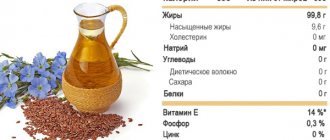All articles by the author
Author of the article: Maxim Fadovsky
Healthy and healthy lifestyle specialist.
Pregnancy and childbirth are the happiest moments in a woman’s life. During this period, it is very important that the body is filled with necessary microelements, vitamins and nutrients. However, despite all its beneficial qualities, flaxseed oil has a number of contraindications during pregnancy and breastfeeding.
What benefits are contained in flax seeds?
First of all, this product is known for its unique composition. Among its components, it is worth highlighting polyunsaturated fatty acids, which help avoid many pathologies in the cardiovascular system, help thin the blood and lower cholesterol levels. Flaxseed oil for weight loss.
In addition, flaxseed oil for pregnant women allows you to replenish the required amount of vitamins (B9 and E) and microelements (phosphorus, etc.). The seeds contain many amino acids, most of them are essential. Flaxseed oil also contains phytosterols and glycosides.
Benefits for women
Flaxseed oil during pregnancy strengthens overall immunity. This product will relieve constipation, which often occurs during pregnancy and breastfeeding. Another positive aspect is the strengthening of hair, because during this period a woman often faces the problem of severe loss of hair follicles or brittle nails. Aloe vera for hair.
Flaxseed oil is taken very carefully when breastfeeding, otherwise it can cause a severe imbalance of hormones in a woman’s body and harm the baby’s health.
During pregnancy, flaxseed oil is best used externally instead of creams
Can flaxseed oil be consumed by pregnant women?
Women often wonder whether it is possible to drink flaxseed oil during pregnancy. Pregnant women often have problems with stool (frequent constipation). Traditional healers claim that this product helps improve intestinal motility and relieves fecal stagnation. There is no confirmed data on this matter, therefore, despite the properties of the dietary supplement, it is still better to give preference to safer laxatives.
Despite all the beneficial qualities, pregnant women are prohibited from drinking flaxseed oil in the following cases:
- hypersensitivity to the components of this product;
- urolithiasis disease;
- acute cholecystitis or pancreatitis (bananas for cholecystitis);
- frequent diarrhea;
- enterocolitis;
- late stages of pregnancy.
When women ask whether flaxseed oil can be consumed during pregnancy, they give a clear answer: it is contraindicated in this case. If you decide to take this supplement, it is best to consult your gynecologist in advance. This will avoid negative consequences.
In the early stages
Each stage of pregnancy has its own characteristics, which must be taken into account before including this product in your diet. Flaxseed oil in the early stages of pregnancy helps strengthen the immune system, lower blood cholesterol and prevent the formation of stretch marks on the skin.
The polyunsaturated fatty acids that make up it are involved in the development of the child’s brain; they reach him through the placenta. Proponents of such nutrition note the positive effect of Omega-3 and Omega-6 in the formation of the visual organs of the fetus.
The use of flaxseed oil in the early stages of pregnancy is not recommended, as it can cause metabolic disorders, including in the fetus.
It should be used after prior consultation with your doctor. This will reduce the risk of possible complications.
Studies by foreign scientists using this supplement for animals during pregnancy have shown that it can negatively affect the health of the mother and fetus. This is due to phytohormones contained in flax seeds. They can worsen a woman’s hormonal levels and cause disturbances in the development of the child.
Therefore, the use of flaxseed oil during pregnancy is prohibited by many experts. This is primarily due to its ability to relax the muscles of the uterus. In this case, the risk of spontaneous miscarriage increases. Ginger during pregnancy.
In later months
Flaxseed oil should be taken very carefully during late pregnancy. Consuming it under the supervision of a doctor will help you get rid of stretch marks. The product is not recommended for ingestion by women during pregnancy.
It is strictly forbidden to use it for preparing fried foods. This type of processing leads to the destruction of unsaturated acids, as a result the product loses its positive properties and can only cause harm.
You should not take this supplement after a caesarean section - it can cause severe bleeding.
This article will tell you what the benefits of grapes are for women. Are there any benefits from grape seeds?
For stretch marks
Flaxseed oil during pregnancy helps prevent the formation of stretch marks. It is used as a daily rub into the skin. To prevent stretch marks, you need to treat the skin 2-3 times a day. To do this, it is recommended to apply a small amount of oil and rub it into the skin with light massage movements until completely absorbed. The use of aloe vera gel and mango butter in cosmetology.
Contraindications
Despite the pronounced positive effect of taking the drug, its high effectiveness leads to the presence of a fairly large number of contraindications. Flaxseed oil should not be taken by expectant mothers who suffer from:
- Acute cholecystitis (active movement of bile can cause increased symptoms). Chronic, compensated use of the drug allows.
- Acute pancreatitis for the same reason. It is also allowed for chronic use.
- Disturbances, changes in the functioning of the pancreas, gall bladder (same reasons).
- Significant changes in the level of liver enzymes in the blood, characteristic of pregnant women.
- Concretions of the liver, pancreas, gall bladder. Activation of the bile flow provokes the displacement of stones, which can cause blockage, pain, and colic.
- Acute intestinal pathologies.
- Diarrhea.
- First and last trimesters of pregnancy.
Before use, consult a specialist - he will determine whether there are individual contraindications.
Is it allowed to use while breastfeeding?
Today, flaxseed oil is not allowed for breastfeeding. It must be remembered that everything eaten by a mother passes to her baby through breast milk. Due to its multi-component composition, the dietary supplement can negatively affect the child’s condition. Often, excessive consumption leads to severe intestinal upset in the baby.
You should be especially careful when introducing this product into your diet in the first couple of weeks after giving birth. Since during this period a woman has natural bleeding, flax oil can enhance it. This will lead to severe bleeding and the woman may end up in a hospital bed.
During breastfeeding, it is strictly forbidden to drink flax seed oil in its pure form. It is best used for dressing salads or cereals. Polyunsaturated fatty acids and lignans, which are included in the composition, tend to be absorbed very quickly into breast milk, their level decreases for a very long time (within 7 days). An excess of these components causes serious disturbances in the development of the child.
In addition, taking the supplement during lactation interferes with the process of natural postpartum contraception. Is it possible to eat bananas during breastfeeding?
Side effects
Despite the beneficial properties of flax oil, we must not forget about possible side effects. For example, increased intestinal motility can provoke activation of the uterine muscles, resulting in spontaneous miscarriage or premature birth.
Oil can also cause allergies due to individual intolerance to this product by the body. It is worth noting that this is rare.
Exceeding the recommended dosage of oil can increase blood clotting and lead to the formation of blood clots, lower blood pressure when it is not necessary, and aggravate the course of diseases of the digestive tract. That is why flaxseed oil should be taken with caution when planning and during pregnancy, following the advice of a doctor.
Flaxseed oil is a true gift of nature. In reasonable quantities, it will help maintain the health of the expectant mother and provide good conditions for the development of the fetus. It must be remembered that only if taken correctly, this product can bring invaluable benefits.
Negative consequences may appear if you do not know how to take this product correctly. The main negative reactions of the body to the product are as follows:
- nausea;
- diarrhea;
- skin rashes like urticaria.
If side effects occur, stop using the oil and visit a doctor managing the pregnancy.
How to drink during pregnancy and breastfeeding?
For pregnant and lactating women, the recommended daily dose is 1 teaspoon of dietary supplement. Depending on the indications, it is used in the morning on an empty stomach or before bed. In the latter case, its effectiveness in combating constipation increases. You cannot drink it with hot drinks. If it is not possible to use the product in its pure form, you can purchase capsules with flax seed oil at pharmacies.
The average course of treatment is 1 month. During the first week, the amount of the product gradually increases and already on the 8th day the woman is allowed to consume 2 teaspoons (or 1 tablespoon) per day. After completing the course, it is recommended to take a break, then, if necessary, re-treat.
Self-medication is not recommended during pregnancy and breastfeeding. Any manipulations should be carried out after consultation with your doctor. Otherwise, severe harm can be caused to the body of the mother and her unborn child. How to take fish oil correctly - read here.
Application in the cosmetic field
Of course, you can get an excellent food product from flax seeds. However, flaxseed oil is also successfully used for cosmetic purposes.
- Application for restoration of brittle hair. The effect is achieved due to the fact that the oil perfectly saturates the scalp with useful substances, while splitting the ends of the hair and hair loss is significantly reduced.
- Preventing stretch marks. Taking precautions is much easier than getting rid of defects after they appear on the body. Flaxseed oil can make the skin of problem areas firmer and more elastic. To do this, the oil must be rubbed into the desired areas daily.
- Moisturizing and intensive nutrition of dry skin. Flaxseed oil can be used on all areas of the body and regardless of a person's skin type. Often used for massage manipulations.
Undoubtedly, flaxseed oil is a real gift! But all gifts of nature must be used wisely and carefully. This is especially important during pregnancy, when the serious task is to bear and give birth to a healthy child!
Review Reviews
Women who used flaxseed oil during pregnancy leave positive reviews. Most women note the beneficial qualities of the product during pregnancy and breastfeeding as a remedy for the formation of stretch marks.
Some women claim that taking 1 teaspoon of this dietary supplement during future pregnancy will help avoid severe tearing during childbirth.
Young mothers speak negatively about the use of this product during lactation. Side effects include severe digestive upset in the baby.










